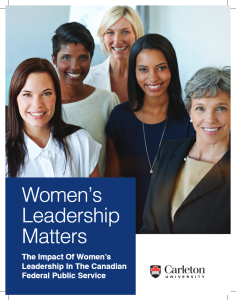Women’s Leadership Matters: The impact of women’s leadership in the Canadian federal public service
This research was undertaken as a partnership between the Public Service Commission of Canada and the following at Carleton University: Centre for Women in Politics and Public Leadership, Gender Equality Measurement Project, Centre for Research and Education on Women and Work. This report is also Canada’s contribution to the Washington, D.C.-based Wilson Center’s Global Women’s Leadership Initiative Women in Public Service Project (WPSP).
The study sought to determine whether women in leadership positions in the Canadian federal Public Service (PS) have had an impact on policy, programs, operations, administration or workplace conditions, what that impact might be, and how to measure it. The impact of other Employment Equity groups (persons with disabilities, members of visible minorities and Aboriginal peoples) also formed part of this research in a preliminary exploration of how and why representative bureaucracy may work.
The study is based on qualitative interviews with 26 female and male, current and retired Executive (EX) and Deputy Minister (DM) and equivalent level managers in the Canadian federal public service. Key findings are that
- Women have a significant impact on programs and culture:
- The major impact over the past 25 years is on changing cultural norms, establishing an inclusive workplace and influencing leadership expectations. The majority of women and a minority of men interviewed for this study identified their leadership style as a significant contribution they are making to the PS. All of them characterized their leadership style as open, collaborative, and less hierarchical. They emphasized empathy and supporting employees to be their best. This corresponds to the “women’s leadership style” documented in management literature. It should be noted that not all women embody this style and some men do. Although the value of this style is recognized, PS structures and hierarchies do not necessarily facilitate this style.
- The cultural change brought about by women has been widespread across government, albeit less so in the central agencies and in those where women are neither half the personnel nor half the leadership, such as the Royal Canadian Mounted Police (RCMP) and Canadian Armed Forces (CAF).
- Through their work in the PS, women also have an impact on policy, programs and operations such as in fisheries, the automotive industry, national security, natural resources, the environment, science, human resources and international relations. In some cases, these public servants may have been among the few or only women in discussions that involved male-dominated industries or sectors, providing an avenue for the representation of Canadian women’s perspectives in these areas.
- Diversity matters:
- All the research participants agreed that having diversity around the table contributes to better policy, program development, operations, public consultations, services and workplace conditions. Most were able to give concrete examples of how women, people with disabilities, Aboriginal people and people from ethnocultural minority or linguistic minority backgrounds were able to bring something to the table from their own backgrounds, experiences or perspectives by being able to see something that was otherwise missed.
- The value of this diversity was not limited to gender and the Employment Equity (EE) groups (persons with disabilities, members of visible minorities and Aboriginal peoples), but also included having operations and regional people at the policy development table.
- A critical mass was seen as important for members of under-represented groups to feel comfortable and to be able to contribute without fear of marginalization or harassment.
- Barriers and facilitating factors:
- Factors that enabled public servants to make a difference included trust, leadership programs and training, management that is open, supportive and flexible, latitude, a non-hierarchical approach, an open and inclusive workplace culture, openness at the political level, being allowed to take initiative and innovate, role models and mentorship, having intelligent and skilled team members, and determination, persistence, and resilience.
- Fear, lack of trust, risk aversion are the primary factors that can constrain public servants from making a difference, followed by system rigidity (including hierarchy, onerous, unnecessary time-consuming procedures and paperwork and structural blocks), the political level and other workplace constraints (such as bad managers and constant changes in priorities).
The study also documents the difficulties related to measuring impact and recommendations for the Government of Canada. The appendix contains information about how Canada reached a high level of female leadership in its public service.


